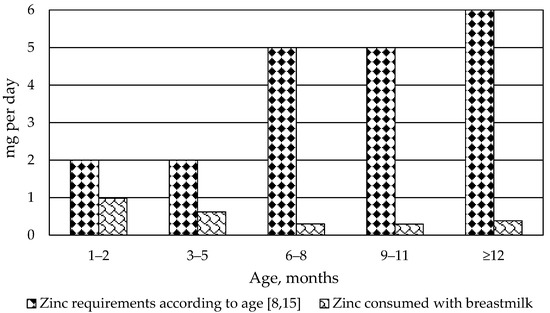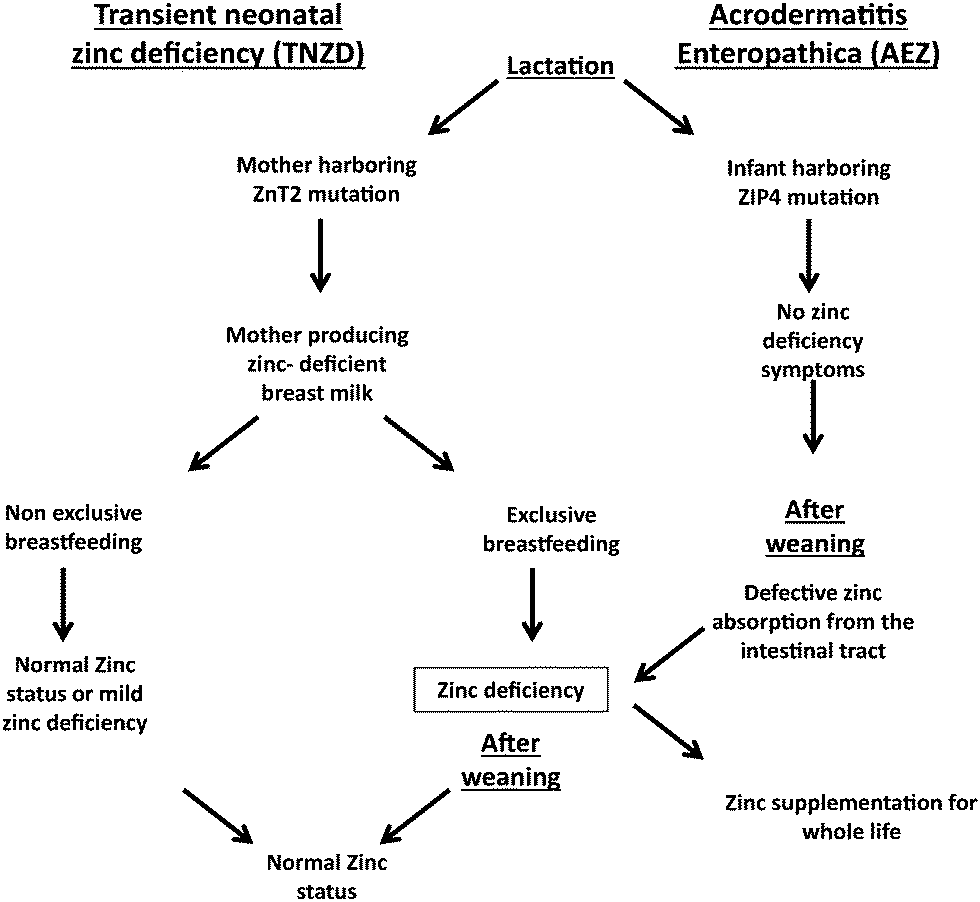Breast Milk Zinc Deficiency
It is caused by defective transfer of zinc into breast milk. AE tends to present when weaning a child from breast milk.

Severe Conditioned Zinc Deficiency In Breast Fed Premature Infants European Journal Of Pediatric Dermatology
Acrodermatitis enteropathica in preterm infants can be due to zinc-deficient breast milk or a mutation of the transporter protein.

Breast milk zinc deficiency. Zinc is an essential cofactor a cellular building block and a vital mineral that plays an exceptionally versatile role in the body yet unfortunately zinc deficiency remains the most common micronutrient deficiency in the world. Preterm Introduction There are indications that preterm babies fed either formula or pooled breast milk are at risk of zinc deficiency. Not present in cows milk which facilitates zinc absorption5 Howeverthe development ofacroder-matisenteropathicain abreast-fed preterminfant6 and of symptomatic zinc deficiency in 2 preterm infants whohadreceived intravenous feeding for 6 and 3 weeks before the introduction of breast milk7 suggests that human breast milk does not.
Each Test is a specific orderable test from a particular laboratory and is assigned a unique GTR accession number. Because the nutrients in breast milk come from your own maternal stores having a poor zinc status going into pregnancy or nursing will increase your risk for zinc deficiency. Infants who dont receive enough zinc in their diet are in danger of immunological and developmental problems.
From blood to hair it is found in almost every part of the body. Ad Chicken Essence for Breastfeedingwith special TCM formula nourish body without burden. A single mutation in the SLC30A2 mutation can reduce breast milk zinc.
The Recommended Dietary Allowance for zinc while nursing is 12 milligrams per day. Tailor-made formula developed by qualified TCM physician for breastfeeding mom. Where this is the case symptoms begin soon after a baby is weaned off breast milk.
Symptomatic zinc deficiency developed in an exclusively breastfed fullterm infant. Maternal dietary zinc intake was nearly the recommended intake for lactating women. Yet zinc content in breast milk was unaffected by maternal dietary zinc intake r 0155.
Zinc content in breast milk was affected by time postpartum. SLC30A2 gene sequence analysis. Breast milk zinc deficiency.
Babies in Latvia might not receive sufficient zinc intake with breast milk. In this condition there is an absence of a transport protein which normally allows zinc absorption resulting in severe deficiency. The format is GTR000000011 with a leading prefix GTR followed by 8 digits a period then 1 or more digits representing the version.
Even if they do successfully breast-feed their breast milk will likely contain a lower than normal amount of zinc which can cause severe zinc deficiency in exclusively breast-fed infants. Although zinc deficiency has been well documented in a few term otherwise healthy breast-fed infants 3 4 and the zinc derived from human milk alone may not be adequate with more prolonged. Type II hypozincemia of infancy is a rare hereditary zinc deficiency occurring in infants while exclusively on breast feeding.
Ad Chicken Essence for Breastfeedingwith special TCM formula nourish body without burden. Her older brother had also developed zinc deficiency while being exclusively breastfed. Breast milk zinc concentrations were low throughtout lactation and this inadequacy is the likely cause of the deficiency in both infants.
Some women fail to generate adequate zinc levels in their breast milk and that can also have a genetic cause. Transient neonatal zinc deficiency occurs in breast-fed infants as a consequence of low milk zinc concentration in their nursing mothers which cannot be corrected by maternal zinc supplementation. Median maternal zinc intake was 1070 7241527 mg.
Future research should aim for the assessment of zinc status by evaluating plasma or serum levels of both mothers and babies. Time postpartum was a significant negative predictor for zinc content in breast milk r -0500. The importance of zinc for a healthy living is beyond the shadow of a doubt.
Future research should aim for the assessment of zinc status by evaluating plasma or serum levels of both mothers and babies. Infants with zinc deficiency should be supplemented with 2mgkg of zinc sulfate daily and they may continue to breastfeed. Zinc content in breast milk was affected by time postpartum.
Babies in Latvia might not receive sufficient zinc intake with breast milk. A large amount of zinc an essential trace mineral is required for normal growth particularly in infants and breast milk normally contains adequate zinc to meet the requirement. Tailor-made formula developed by qualified TCM physician for breastfeeding mom.
A form of dermatitis is typically the first manifestation of zinc deficiency. Primary and acquired acrodermatitis enteropathica have similar cutaneous and non-cutaneous findings. The infants zinc level should be measured not the maternal zinc level.
Zinc deficiency may occur as a result of. This tendency does not require two gene abnormalities one is sufficient and people who have this condition have a 50 chance of passing it on to their offspring. Maternal dietary zinc intake was nearly the recommended intake for lactating women.
Units that feed very low birth-weight babies preterm milk should check its zinc concentration or at least have a high index of suspicion for this nutritional deficiency. A rare inherited condition called acrodermatitis enteropathica is an occasional cause of zinc deficiency. The zinc requirements of breastfed infants are generally met with exclusive breastfeeding through 5-6 months of age due to the favorable bioavailability of the zinc in human milk.
A mutation in the gene for a zinc transporter protein may account for abnormally low milk zinc concentrations associated with severe zinc deficiency in breastfed infants. There was a higher proportion of maternal zinc deficiency in zinc-deficient infants than those without zinc deficiency 667 vs 162 p002. Inadequate dietary intake of zinc for example in premature very sick infants or premature breastfed infants whose mothers may suffer from a mild zinc deficiency.
There was a positive correlation between zinc concentrations in breast milk and plasma zinc concentrations of infants r062 p001 and plasma zinc. Only a few dozen cases have been reported. Supplementing the mother with zinc will not necessarily increase the zinc level in the breastmilk.

Breast Milk Zinc Concentration Mmol L In Early 6 Months Of Lactation Download Scientific Diagram

Unique Presentation Of Transient Zinc Deficiency From Low Maternal Breast Milk Zinc Levels Tang 2018 Pediatric Dermatology Wiley Online Library

Nutrients Free Full Text Zinc Content In Breast Milk And Its Association With Maternal Diet Html

The Role Of The Zinc Transporter Slc30a2 Znt2 In Transient Neonatal Zinc Deficiency Metallomics Rsc Publishing Doi 10 1039 C7mt00162b

Clinical Conditions Associated With Increased Risk Of Zinc Deficiency Download Table
Posting Komentar untuk "Breast Milk Zinc Deficiency"